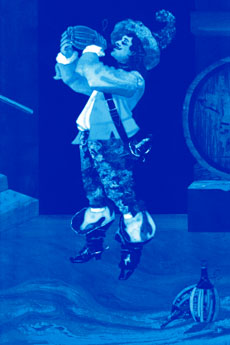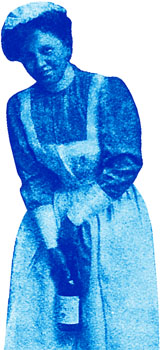Beano’s coming to stay. I’m lucky he gave an announcement. Usually he simply swoops down on the fold like the proverbial Assyrian. Lock up your daughters! No problem there, don’t have any. Lock up your cellars. Ah, that’s going to be more of a problem. I talk it through with J-M who suggests taking my most valuable bottles round to his place. But he has no cellar at all, not even a crawl-space in his horrid little bungalow. Where’s he going to put them: in the garage, in the fridge? A fate worse than death in either case. Then he comes up with the brilliant, if slightly risky, idea of storing them in what we call the “führerbunker”.

| |

 |
Actually, the bunker’s only tenuous connection with the führer is that it was indeed built by Germans, but during WW1 not WW2, as a command outpost for a proposed military rail link that was never constructed. At the time everyone knew the war would be over by Christmas, though quite which Christmas was uncertain. Either way, major building efforts by occupying powers were subject to the same political weather then as they are now and so the spur that was intended to provide an alternate route to bring thousands of tons of ultra-heavy ordinance from Verdun in northern France up to a possible second front in the Netherlands, should the Kaiser decide to ignore Dutch neutrality, was finally shelved. Only the bunker and a couple of outbuildings that look as though they might like to be a station, if there were a train, are left as witness.

Like any underground structure, the bunker maintains a steady temperature all year round, is reasonably dry and has the merit of being almost inaccessible due to the generations of briars and nettles that have grown rank on its once proud intentions. The very real risk is that some disreputable wandering “lodger” might discover my prized two dozen bottles of Nuit-St-Georges and other such wonders and feel obliged to offer them some company on a cold night. But weighing this risk against the dead certainty of Beano dealing ruthlessly with this same plentiful trove led us to load up Miranda and J-M’s Tokyo tank of a 1980 HJ45 Land Cruiser with the precious hoard and drive, very slowly, gently and dignified, like a two-car funeral up the much neglected lane that encircles the bunker mound.

Two hours later we sat on the top of this artificial hillock, much scratched and rather overheated in the suddenly mild January weather, congratulating ourselves on having thoroughly outmanoeuvred Beano, who would now have to make do with cheap plonk from the local superette ... unless of course he found the vintage Port and the Tokay. We had stacked up a mass of retired furnishings and boxes of old National Geographics in front of the entrance to the tiny recess where these precious bottles of absolutely non-travelling wines lay in their dust. But I still knew that a desperate and sufficiently motivated Beano would doubtless sniff them out in a minute unless I could distract him with a curvaceous Slovenian physiotherapist or two.

| |
 |
Vain effort, wasted labours, fine wines shaken up for no reason: “Ah”, you are thinking, “the dreaded Beano now fails to appear”. Wrong. The dreaded Beano does appear, but in a singularly sheepish guise, for it is a much chastened and contrite Benjamin Arnolfini who finally parks his discrete little car in my drive and unfolds his lanky, haggard form from its snug interior. I should have known something was wrong when he politely called ahead to announce his arrival.

“I’m ruined, Droodie”, he tells me as he wrings my hand; his face a mask of woe, “utterly wrecked and ruined.”

My vague wave at the surrounding courtyard is meant to imply that everything that is mine to give is his to command. Such is the way of real friendship, should he require my help. I find a simple gesture is more eloquent on such occasions and far less sinful than a barefaced lie. I am, at that moment, exulting inwardly at our concealing ruse, since, to my knowledge, nothing in the world can drink more (and be choosier about it, too) than a wrecked and ruined man.

Once inside I ask carefully, not wanting to sound too keen for details, exactly what form this ruination took. High risk portfolio? Bad run at the casino? Fast women and slow horses? Beano assures me it’s none of the above. His finances are in slim but perfect order. “Dear heavens, not some awful illness?” I gently probe. Whereat Beano insists that though he’d like to die, he’s actually never felt better. “Then what on earth is the matter, man?”

“She’s left me”, says Beano, “for a paunchy bloody stockbroker”.

Now anyone who has known Beano has known Don Juan himself, anyone who has seen Beano has seen a roué and a rake. That gaunt form with the slightly drooping left eye and the general disdain for tailoring is one of the last great European womanizers. So what I am hearing now seems little short of impossible. At the age of fifty-five, Beano had not only loved but also lost, and both probably for the first time in his life. Who is this paragon of womanly virtue who has succeeded in lighting such a flame yet avoided being consumed by it?

Her name, it transpires, is soon to be Diana Spooner, after one Roger Spooner, the “pudgy bloody stockbroker”, but it is still Williams as I write this, the wedding being set to eclipse Prince William and Kate at the end of April, and she is Welsh. She is a doctor by profession and strictly “chapel” (a Welsh expression for a variety of non-Anglican variants of Protestantism, mostly Baptist or Methodist, that have always thriven in the valleys) and, judging by a much-handled photo, she bears more than a passing resemblance to Helena Bonham-Carter (one of whose aunts, by the way, had a brief fling with Uncle Haviland just before the war, and was instrumental in getting him introduced to Churchill, with whom her family was connected). Anyhow, in a combination of professional concern and the teetotalling zeal of a true Wesleyan this beautiful creature (Miss Williams, not Miss Bonham-Carter) succeeded in swearing Beano off the bottle for the sake of his liver and, clearly not wishing to squander a winning streak, in persuading him to stop chasing Russian nurses for the sake, firstly, of his mortal soul and secondly, of his manhood, which article she threatened to remove surgically if he so much as strayed an inch from the true path.

Subsequent to this agreement they had enjoyed, according to Beano, “thirteen months of unadulterated and heavenly bliss,” before she plunged him into “sudden and apocalyptic darkness at noon.”

“What went wrong?” I ask.

“It’s my belief that nothing under God’s blue sky is less fun”, says Beano, “than a reformed bad boy. One day she simply woke up and realized this sorry truth, after which the rest was inevitable.”

“You mean she didn’t love you any more once she’d got you exactly where she wanted you? That sounds familiar, one of those serial makeover specialists who like to hit and run. I know the type.” The irony is lost on both of us that such behaviour was a warped looking glass version of the “old” hit and run seducer that used to be Beano.

“I suppose you would put it unkindly like that” says he, “but I prefer to think that, well, you know, having tidied me up and straightened me out, knocked off all the dirt and given me some manners, she came to realize how fundamentally boring I am. Because I am boring, Droodie, I’m dull, dull, dull. Notoriety was my only interesting feature. Without that, I’m nothing really much: not especially bright, not particularly handsome, not all that funny (if I can’t tell risky jokes), in no way am I talented, can’t sing, can’t dance, nothing. I’m not even spectacularly rich, not like bloody Podger.”

Something in my head goes “ping” like an egg-timer. “Podger! Did you say Podger? Are you telling me the silly thing went and married Roger the Podger? Of course I remember now, he changed his name by deed poll after all the ragging we gave him at school, but I never knew to what. Why on earth did he choose Spooner? It’s almost as bad!”

“It was his mother’s maiden name.”

“But how did she meet him of all people. I haven’t even thought of him in forty years.”

“Unlike you, we never lost touch. Podger’s okay in an old-fashioned, steady-the-buffs, Tory sort of way. He’s a bit of a cold fish, but he’s not a bad person, probably the only “honest broker” I know. He manages my money, has done for decades, and manages lots of other people’s money too. He’s done very well at it. She met him at a party. My party. For her. To show her off to my friends. Stupid, really. The man’s got a huge faux-Tudor pile in Esher ... and a Rolls. No one can resist a Rolls, certainly not a little wench from the Rhonda.”

“So she’s marrying him for the money?”

“I hope so, in a way I’d rather believe she were mercenary than believe her untrue. Yes, I bloody well hope it’s for the money, because, well, because if it’s for love, Edwin, I don’t stand a sodding chance ... not ever. If she’s found the only bit of Podger that’s in the least tolerable enough to be loveable at a pinch, then she might just love it all the way to grandchildren. In which case there’s no hope left, certainly nothing worth leading a goodly life for. I may as well go back to my old reckless ways, live on your couch and get royally drunk every day until I die.”

“I’m sure it’s for the money, definitely ... the mercenary bitch” I mutter with an eye on the cellar door. “But she’ll come to her senses, you’ll see, sooner or later”

Beano groans at the word later: “by the time I’m seventy or something, maybe! I’ll be a bloody saint by then and I won’t even look at a skirt. I stopped at a little restaurant in Lille yesterday and couldn’t even bring myself to flirt with the waitress. It’s depressing. I feel myself getting holier every day. I’ll be a monk by then.”

“No, Beano, this all might happen a whole lot faster than you think, because I have a wizard scheme. I don’t want to celebrate victory before we’ve even raised the flag, but we have a campaign to plan and there’s someone I’d like you to meet.”
To be continued ...
©
Edwin Drood, January 2011